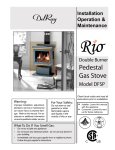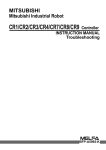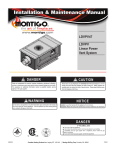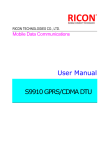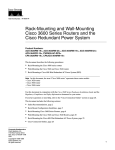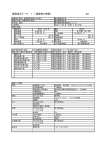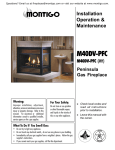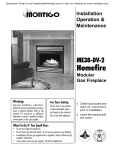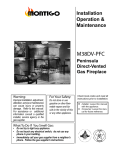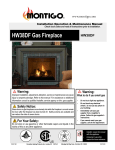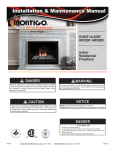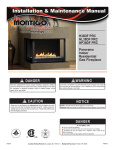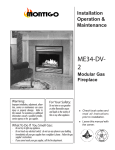Download Montigo Rio DX Installation guide
Transcript
www.montigo.com Installation Operation & Maintenance Manual Check local codes and read all instructions prior to installation. Rio DX Cast Stove Rio DX Cast Stove HL38DF-PFC Shown Warning: Improper installation, adjustment, alteration, service or maintenance can cause injury or property damage. Refer to this manual. For assistance or additional information consult a qualified installer, service agency or the gas supplier. Safety Notice: Glass doors on gas fireplaces are extremely hot while the fireplace is on and remain hot even after the fireplace has been turned off. Safety screens are available and can reduce the risks of severe burns. For Your Safety: Do not store or use gasoline or other flammable vapors and liquids in the vicinity of this or any other appliance. ® XG0512 C US Canadian Heating Products Inc. Langley, BC V4W 4A Warning: What to do if you smell gas • • Do not try to light any appliance. Do not touch any electrical switch; do not use any phone in your building. • Immediately call your gas supplier from a neighbor's phone. Follow the gas supplier's instructions. • If you cannot reach your gas supplier, call the fire department. • Installer: Leave this manual with the appliance. • Consumer: Leave this manual for future reference. Montigo Del Ray Corp. Ferndale, WA 98248 120507 Rio DX Cast Stove Table Of Contents Introduction About this Stove: Introduction................................................................................ 2 Installation Choosing a Location....................................................... 3 Installing the Gasline....................................................... 4 Direct Vent Installation.................................................... 4 General Requirements....................................... 4 Terminations....................................................... 4 Horizontal(Top Vent Through-the-Wall) Installations.6 Vertical (Top Vent Through-the-Roof) Installations.. 7 Thank you for purchasing the Rio DX Cast Stove, and choosing a Delray Gas Product. This Rio Stove features a 28,000 BTU double burner with embers, and a hi-lo adjustable control. . This Stove is certified for use with Montigo Direct Vent Components. The Rio DX Stove is certified as a heating appliance by CGA and AGA tothe Vented Gas Fireplace Heater standard (ANSI Z21.882005 · CGA 2.33-2005) and is rated for: Natural Gas Propane 28,000 BTU/H Maximum Input 20,500 BTU/H Minimum Input 28,000 BTU/H Maximum Input 20,500 BTU/H Minimum Input Removing and Installing the Door................................... 8 How to use this manual: Installing the Logset........................................................ 9 Wiring ........................................................................... 9 This manual covers installation, operation and maintenance. Lighting, operation and care of this fireplace can be easily performed by the homeowner. However, all installation and service work should be performed by a qualified or licensed installer, plumber, or gasfitter who is qualified or licensed by the state, province, region, or governing body in which the appliance is being installed. Operation...........................................................................10 - 12 Maintenance......................................................................12 - 13 Warranty................................................................................... 14 A. Termination Locations............................................... 15 This manual covers all versions. Sections which are specific to a particular version are marked with a symbol, plus the appropriate model number. B. Accessories and Vent Components...................16 - 17 Warranty and Installation Information: Appendix CAUTIONS Due to its high operating temperatures, the appliance should be located out of traffic & away from furniture and draperies. Children and adults should be alerted to the hazards of the high surface temperature, which could cause burns or clothing ignition. Young children should be carefully supervised when they are in the same room as the appliance. Clothing or other flammable materials should not be placed on or near the appliance. The Montigo warranty will be voided by, and Montigo disclaims any responsibility for, the following actions: Modification of the fireplace and/or components including DirectVent assembly or glass doors. Use of any component part not manufactured or approved by Montigo in combination with this Montigo fireplace system. Installation other than as instructed in this manual. Consult your local Gas Inspection Branch on installation requirements for factory-built gas fireplaces. Installation & repairs should be done by a qualified contractor. Installations in Canada must conform to the current CAN/CGA B-149.1 and .2 Gas Installation Code and local regulations. If the optional air-circulating fan kit is installed, it must be electrically grounded in accordance with CSA C22.1 Canadian Electrical Code Part 1 and/or Local Codes. Installations in the USA must conform to local codes, or in the absense of local codes to the National Fuel Gas Code, ANSI Z223.1-1988. If the optional air-circulating fan is installed, it must be grounded in accordance with local codes or, in the absence of local codes, with the National Electrical Code, ANSI/NFPA 70-1987. See Appendix A for fireplace installations within the State of Massachusetts. Page 2 Part No. XG0512 Rio DX Cast Stove Installation Choosing a Location The fireplace may be installed in any location that mantains clearances to air conditioning ducts, electrical wiring and plumbing. Safety, as well as efficiency of operation, must be considered when selecting the fireplace location. Try to select a location that does not interfere with room traffic, has adequate ventilation, and offers an accessible pathway for vent installation. Refer to page 4 - Vent Installation for more information. The Rio's dimensions are shown below: Top View Front View Side View Figure 2a. Minimum clearances to combustible surfaces. When installing this stove in an alcove, the minimum clearance from the top of the stove to a combustible surface is 42". (Minimum 1" clearance must be maintained around the vent pipes.) Figure 1. Stove dimensions. Clearances The Rio DX Cast Stove's minimum clearances to combustible materials are: A - Back* B - Control Side† 3 ½" C - Right Side D - Floor 0" E - Top** 44" F - Corner*** 24" 10 ½" 2" * See diagrams below for explanation. ** Clearance from the top of the stove to a combustible ceiling. † Clearance may be reduced to 10 ½ only when installing in a corner installation. Part No. XG0512 Figure 2b. Minimum 2" clearances to combustible surfaces for a corner installation.*** ***When installing the DXFS in a corner application, the clearances may be further reduced to 2", only when an on/off/ remote/ or thermostatic control is installed in an accessible location. If this on/off/ remote/ or thermostatic control is not installed, then the clearance of 10 1/2" must be maintained. Page 3 Rio DX Cast Stove Installation Installing The Gas Line The gas line must be installed before completing the installation. Natural Gas requires a minimum inlet gas supply pressure of 5.5" W.C. & a manifold pressure of 3.5" W.C. Propane Gas requires a minimum inlet gas supply pressure of 11" W.C. & a manifold pressure of 10" W.C. Provision must also be made for a 1/8" N.P.T. plugged tapping and be accessible for test gauge connection immediately upstream of the gas supply controls to the appliance. The stove is supplied with a flexible gas connector which is factory installed. The gas valve is located on the back of the stove as indicated in figure 4. It should be attached to the gas line with an approved fitting, as required by the applicable installation codes. • Only use gas shut-off valves approved for use by the state, province, region, or governing body, in which the appliance is being installed, or as required by the applicable installation codes. • Flexible gas connectors must not exceed 3 feet in length, unless it is allowable within applicable installation codes. Direct Vent Installation This section covers the installation of venting and terminations. Installation Requirements Rio Stoves are certified for use with Montigo Standard Series (4" / 7") venting components and approved Vent Kits (listed below) Minimum 1" clearance to combustibles required for vent pipes Use only certified Montigo vent components. (Use of other parts will void the Montigo warranty, and may impede the operation of the stove.) All joints must be secured with a minimum of two screws per joint Vent terminations must not be recessed in walls or siding Horizontal runs must be supported by a minimum of two supports per horizontal run. A minimum of one screw on each side of support is also required Flex vent sections may be stretched up to 50% of their total length (eg. a 24" section may be stretched to 36") Maximum horizontal run for a flex section with no vertical rise is 3 feet. Flex vent sections over 3 feet must fall within the limits set by the venting graph and must have a minimum vertical rise of 3 inches per foot of flex. Venting components can be used in any combination of solid/rigid Solid vent sections may be cut less than half way from the tapered end Venting components can be used in any combination of solid/rigid pipe or flex pipe and in any orientation (Male connectors can face in any direction) Figure 4. Gas line access. During any pressure testing of the gas supply piping that excedes 1/2 psig (3.5 kPa), the appliance and its individual shutoff valve must be disconnected from gas supply system. Vent Terminations Selecting A Termination Location Choosing your vent termination location will help to determine whether When pressure testing the gas supply piping system at test pressures of less than or equal to 1/2 psig (3.5 kPa), the appliance must be isolated from the gas supply piping system by closing its individual manual shutoff valve. Note: After gas line is connected, each appliance connection, valve and valve train must be checked while under normal operating pressure with either a liquid solution, or leak detection device, to locate any source of leak. Tighten any areas where bubbling appears or leak is detected until bubbling stops completely or leak is no longer detected. DO NOT use a flame of any kind to test for leaks. Figure 5. Fireplace locations and vent terminations. Cautions: Vent terminations can be very hot. If the termination is less than 7 feet above a public walkway, it should be fitted with a certified Montigo Heat Guard. (Part no. MTKOG) Do not obstruct, or attempt to conceal, the vent termination. These actions will affect the operation of the fireplace, and may be hazardous. In heavy snow areas, take extra care to prevent snow buildup from obstructing the vent termination. Page 4 Part No. XG0512 Rio DX Cast Stove Installation Direct Vent Top Vent Venting Runs Installing Terminations with Built-In Frames For the Rio Pedestal Stove there are two types of Top Vent (DV) installations: A) Horizontal (Through-The-Wall) Installations and B) Vertical (Through-The-Roof) Installations. 11 Allowable Vent Runs MTO-3F 11 Before you install any venting, you must determine whether the venting run will be acceptable. Unacceptable venting can affect the fireplace's combustion. Figure 8 shows various vent rises and the corresponding number of 90° bends which can be made. Figure 6. Installing the MTO-3F Termination. 1. Frame the termination opening to 11" x 11". 2. Fasten the termination to the studs using a minimum of 4 Installing Heat Guards over Terminations MTKOG Figure 7. Installing the heat guard. 1. Ensure that the two long mounting brackets are facing the bottom of the termination. (See inset). This will provide more heat protection at the top of the termination, where temperatures are highest. 2. Attach to the faceplate of the termination using four sheet metal screws. The minimum vertical rise for a Top Vent Installation is 29 1/2", which allows 1 - 90° elbow and a maximum horizontal run of 10'. With greater vertical rise, the number of 90° bends may be increased according to the chart below. The total maximum horizontal run (HT) is also shown, and the run between each elbow (Hx) may be any length, as long as it does not exceed (HT). ent Rise1 V (V) 29 1/2" (min.) Max. # of elbows Max. Horiz. Run (HT) 1 10' 4' 2 10' 5' 2 10' 10' 3 10' 15' 3 10' 20' 3 10' 25' (max.) See vertical vent section Vertical rise is measured from the center of the stove's flue collar to the center of the termination. 1 2 See 'Through-the-Roof Installations' Figure 8. Venting limitations for top vent installations. Example: If V= 12', the vent run may use up to 3 - 90° elbows. If H1= 3', H2=2', and H3=3', then HT=8'. This would be an acceptable installation. Part No. XG0512 Page 5 Rio DX Cast Stove Installation A) Through-the-Wall (Horizontal) Venting Option The horizontal venting option requires an FSTK05 Vent Kit. Figure 9 shows the components which are used to attain different vent heights. Additional stove pipe or Montigo Standard Series vent components may be used to increase the vent run, as long as the run still falls within the limits set out in Figure 8. 1 Vertical Rise 64-79" 2 Vertical Rise 43-64" Vertical Rise 29 1/2- - Vertical Rise is measured from the center of the stove's flue collar to the center of the termination. - A - Std. Stove Pipe (FST11) B - 90° Elbow (MEL10MB) C - Oversize Stove Pipe (FST05) D - Standard Termination (MTO-3) E - 5" stove pipe (F/F) 3. Install the first stove pipe onto the FST12 / FST14 ellipse section (refer to Figure 9). Secure the pipe with at least two ½" hex screws spaced approx. 3/4" from the joint. Slide the remaining vertical stove pipes into place, without fastening them. 4. Cut the horizontal stove pipe (FST11) to length. Slide it and the 90°elbow and onto the vertical pieces of stove pipe. Slide the Decorative Wall Plate (Part # FST07) onto the horizontal section, making sure the unpainted side faces the wall. Completing the Vent Run 5. Slide the stove back into position so the pipe protrudes through the wall. Pull the flex forward and attach it to the termination (or other vent sections, if necessary, to extend the vent run) with high temp sealant. Run a bead of high temp sealant around the stove pipe and push the termination on. Attach the termination to the wall as shown on page 5. Adjust the position of the stove pipes so thethat joints are all equally spaced. Ensure that there is at least 1 1/2" overlap between each section. Secure each stove pipe joint with at least three ½" hex screws spaced approx. 3/4" from the joint (so that the brass ring will cover both the joint and the screws). Vertical Rise 29 1/2" Figure 9. Possible venting configurations using the FSTK05 kit. Installing the Stove Pipe Direct Vent 1. Ensure that the intended pathway for the venting is clear.Try to position the stove midway between two studs to avoid having to cut them. Cut and frame a 10" x 10" hole for the termination. Finishing 2. First attach the inner pipe to the stove's flue collar using a bead of high temp silicone. Attach the outer eliptical section as shown in Figure 10. Secure it with four sheet metal screws. 7. Cover each joint in the stove pipes with a brass decorator ring. The rings should cover the joint as well as the sheet metal screws. Attach the ring using the black 3/8" screws provided. Make sure the screw is facing the back of the stove. See Figure 11. Note: The Eliptical section (FST12 / FST14) is shipped with the stove but boxed seperately. 6. Now slide the Decorative Wall Plate against the hole, level it, and secure using four screws. Figure 11. Installing the decorative brass rings. Figure 10. Attaching the FST12 Eliptical Section. Page 6 Part No. XG0512 Rio DX Cast Stove Installation Direct Vent B) Vertical (Through-The-Roof) Venting Option Installing the Stove Pipe When venting through the roof, use an FSTK04 Vent Kit. Additional stove pipe or Montigo Standard Series vent components may be used to increase the vent run, as long as the run still falls within the limits set out in Figure 12. Ensure that the intended pathway for the venting is clear.Try to position the stove midway between two joists to avoid having to cut them. Determine the ceiling box location. Measure a minimum of 6 1/4" between the centre of the pathway and the back wall as shown in figure 13a. For corner installations, measure 24 1/4" between the back corner and the intended pathway as shown in figure 13b. This will maintain the stove's minimum clearances as shown on page 3. Cut and frame an 11" x 11" hole in the ceiling and roof as required. Vertical Vent Requirements: Vertical terminations (Part # MVTK-1) must be installed: • minimum 2' above the highest point where the vent passes through the roof • minimum 6' from a mechanical air inlet • minimum 18" from a parapet wall Install the ceiling box as shown in Figure 13c. Ensure that there is at least 2" clearance from the bottom of the box to the ceiling. Fasten in place with 2 screws per side. Maximum vent height is 25 above the stove's flue collar. (Note: Flame characteristics may change if the maximum vent height is used.) A maximum of two offsets (each offset has two 90° bends) may be made. The total length of the offset(s) must not be more than 25% of the vertical vent height, when measured from center to center of the piping. Example: Slide the MEXT-2 down into position so the male end protrudes into the room below the ceiling box as shown in Figure 13c and secure it temporarily with an MSPXT-7 support plate and ring. Vertical vent height - 20 feet 25% of 20' = 5' max. offset allowed 2 - 2' offsets required = 4' offset This vent configuration is acceptable. Measure the flex pipe (FST08) and cut it to the required length. Install the second collar onto the end of the flex. Attach one end of the flex to the inner collar of the MEXT-2, and secure it with three screws. Slide the decorative ceiling plate about two inches down from the end of the top section of stove pipe. Install the top Figure 13b. Determine the ceiling box location for a corner installation. To ensure that a 10 1/2" clearance is maintaned the centre of the flue should be 24 1/4" from the back corner. Ceiling box MEXT-2 in position 11” Figure 12. Vertical installation options. Left: straight vertical installation (no offsets). 11” Figure 13c. Installing the ceiling box. stove pipe onto the outer collar of the MEXT-2. Now slide the decorative ceiling plate up against the bottom of the ceiling box and secure it with four screws. Install the first spacer spring by sliding it up over the bottom of the stove pipe. Now slide the slip section (Part # FST05) up over the flex, overlapping the top section at least half its length to keep the pipe out of your Part No. XG0512 Page 7 Rio DX Cast Stove Installation way. Install a spacer spring inside the slip section. Slide the last section of standard stove pipe up inside the slip section, again overlapping the two by at least half a pipe length. First attach the inner pipe to the stove's flue collar using a bead of high temp silicone. Attach the outer elliptical section as shown in Figure 10. Secure it with four sheet metal screws. Move the stove into position below the stove pipe. Removing and Installing the Door Removing the door: To access the glass door, open the outer doors on the front of the casting. Remove the 5 nuts around the edge of the glass door, and then pull the door outwards and upwards until it is clear of the door rail.(See Figure 20). Rain shield Figure 14. Installing spacer springs. Installing the slip section. Attach the flex pipe to the inner collar of the FST12 ellipse and install a spacer spring inside this section. Slide the bottom section of stove pipe down over the collar on the FST12 ellipse section. Adjust the position of the stove pipes so that the joints are all equally spaced. Ensure that there is at least 1 1/2" overlap between each section. See Figure 15. Secure each stove pipe joint with at least three ½" hex screws spaced approx. 3/4" from the joint (so that the brass ring will cover both the joint and the screws). Figure 20. Removing or installing the glass door. Installing the door: Slide the bottom of the glass door into the door rail. Be sure the door is pushed all the way into the rail. See figure 21. Attach using the 5 hex nuts. Ensure that a good seal is maintained when re-installing the Finishing Install the ceiling collar over the ceiling box to provide a finished look. Cover each joint in the stove pipes with a brass decorator ring. The rings should cover the joint as well as the sheet metal screws. Attach the ring using the black 3/8" screws provided. Make sure the screw is facing the back of the stove. See Figure 11. Completing the Vent Run Door frame Door rail Figure 21. Detail of the door rail. Run additional components as necessary to bring the venting up through the roof, and install the vertical termination. Figure 15. Positioning and fastening the stove pipes. Page 8 Part No. XG0512 Rio DX Cast Stove Installation Installing the Log Set Wiring Installing the Logs: The Rio DX Stove is supplied with six (6) fibre logs. Unpack the logs and handle them very carefully. 1. Remove the door cover and the glass door. Wiring for the optional Blower Kit The Rio Steel Stove may be equipped with an optional variable speed blower kit (Part #RFK1080) for circulating additional heat into the living space. Installations in Canada which employ the blower kit must be electrically grounded in accordance with CSA C22.1 Canadian Electrical Code Part 1 and/or Local Codes. Installations in the USA which employ the blower kit must be grounded in accordance with local codes or, in the absence of local codes, with the National Electrical Code, ANSI/NFPA 70-1987. For more information see the Installation Guide included with the blower kit. NOTE: Figure 22. Positioning for the front and back logs. 2. Place the Back log onto the back log rest as shown in figure 22. The log has a lip on the bottom which fits into the slot on the log rest. 3. Place the Front log onto the front log rest as shown in figure 22. Center the log from side to side, and push it against the back of the log rest. Carefully push the log onto the metal spikes on the log rest. 4. Place the top logs in position as shown in figure 23. 5. Start the fireplace. If the flame appears satisfactory, replace the glass door and close the outer door. Left log Right log Back log If any of the original wire supplied with the appliance is replaced, it must be replaced with the same type, or its equivalent. Figure 26a. Wiring for optional air circulating blower kit. 115/1/60 Supply G L1 L2 Optional Fan Switch Motor Speed Control Center logs Figure 23. Proper placement (top view). Front log Figure 26b. Wiring schematic for optional blower kit. NOTES: If logs are not placed properly, excessive sooting will result. The surface of the logs will crack due to the heat from the flames. This is a normal occurance. Part No. XG0512 Page 9 Rio DX Cast Stove Operation For Your Safety - READ BEFORE LIGHTING: WARNING: If you do not follow these instructions exactly, a fire or explosion may result causing property damage, personal injury or loss of life. A. This appliance has a pilot which must be lighted by hand. When lighting the pilot, follow these instructions exactly. B. BEFORE LIGHTING smell all around the appliance area for gas. Be sure to smell next to the floor because some gas is heavier than air and will settle on the floor. What To Do If You Smell Gas: Do not try to light any appliance. Do not touch any electrical switch; do not use any phone in your building. Immediately call your gas supplier from a neighbour's phone. Follow the gas supplier's instructions. If you cannot reach your gas supplier, call the Fire Department. C. Use only your hand to push in or turn the gas control knob. Never use tools. If the knob will not push in or turn by hand, don't try to repair it, call a qualified service technician. Force or attempt to repair may result in a fire or explosion. D. Do not use this appliance if any part has been under water. Immediately call a qualified service technician to inspect the appliance and to replace any part of the control system, and any gas control which has been under water. Lighting Instructions: STOP! Read the safety information above on this label. Locate the gas control valve on the back left side of the unit. to "OFF." Push in gas control knob and turn clockwise Wait five (5) minutes to clear out any gas. Smell for gas, including near the floor. If you then smell gas, STOP! Follow "B" in the safety information above on this label. If you don't smell gas, go to the next step. 5. Locate pilot burner (See illustration at right.) and follow steps below. 1. 2. 3. 4. Gas control knob (shown in “Off” position) Hi/Lo control knob NOTE: Gas control knob cannot be turned from "PILOT" to "OFF" unless knob is pushed in slightly. Do not force. to "PI6. Turn knob on gas control counterclockwise LOT." 7. Push in gas control knob completely and hold. Light with Piezo Igniter button. Continue to hold the control knob in for about (1) minute after the pilot is lit. Release the knob and it will pop back up. Pilot should remain lit. If it goes out repeat steps 3 through 8. If knob does not pop up when released. Stop and immediately call your service technician or gas supplier. If the pilot will not stay lit after several tries, turn the gas control knob to "OFF" and call your service technician or gas supplier. 8. Push in gas control knob and turn counterclockwise to "ON." 9. Turn on remote switch to ignite fire. To Turn Off Gas To Appliance: 1. Turn off remote switch. 2. Locate the gas control valve on the back left side of the unit Page 10 3. Push in gas control knob slightly and turn to "Off". Do not force. clockwise Part No. XG0512 Rio DX Cast Stove Operation Maintenance Lighting Instructions See pages 12 and 13. Adjusting the Burner DX Cast Stoves are equipped with an adjustable burner, allowing you to increase or decrease the amount of flames and heat output. To adjust the flames, locate the black knob marked 'Hi-Lo', on the right side of the gas control valve (See Figure 27). To raise the flame height, turn the black knob (located behind the lower trim) clockwise. To lower the flame height, turn counterclockwise. CAUTIONS Fireplace gas control must be in the “OFF” position and pilot and main burners extinguished when cleaning appliance with a vacuum. Doors and logs can get very hot. Handle only when cool. General Have the fireplace installation inspected yearly, including a visual check of the vent system, the burner and the pilot flame. For your convenience a 1/8" manifold pressure tap is supplied on the gas valve for a test gauge connection. See Figure 28. For Natural Gas this appliance requires a minimum inlet pressure of 5.5" W.C. and a manifold pressure of 3.5" W.C. Gas control knob (shown in “Off” position”) LO HI Hi/Lo control knob Figure 27. Hi-Lo' Adjustment on the Rio Stove's gas valve. For Propane Gas this appliance requires a minimum inlet pressure of 11" W.C. and a manifold pressure of 10" W.C. Always keep the fireplace area clear and free of combustible materials, as well as gasoline and other flammable vapours and liquids. Do not use this appliance if any part has been under water. Immediately call a qualified service technician to inspect the appliance and to replace any part of the control system and any gas control which has been under water. Cleaning When the fireplace is first activated, there may be some smoking and a visible film may be left on the glass. This is a normal condition, and is the result of burning of protective coatings on new metal. Glass must be cleaned periodically to remove any film (which is a normal biproduct of combustion) which may be visible. Film can easily be removed by removing the door, as shown on page 8. Handle the door carefully, and clean it with non-abrasive glass cleaners. One of the most effective products is Kel Kem. Silicone seals on inner door during initial firing will "off gas", leaving a visual deposit of a white substance on combustion chamber walls. This can easily be removed using normal household products. Use a vacuum cleaner or whisk broom to keep the control compartment, burner, and firebox free from dust and lint. Logs may be cleaned periodically with a vacuum to remove soot WARNING: Do not attempt to clean glass when hot. Do not clean glass with abrasive materials as any glass etching may cause premature glass failure. Part No. XG0512 Page 11 Rio DX Cast Stove Maintenance Troubleshooting Gas Control Valve HONEYWELL SV9500 /9600 Troublshooting Sequence Power Generator On/Off Switch NOTE: Before Troubleshooting, Familiarize Yourself With TH START The Startup And Checkout Procedure. TP TH-TP Figure 17. Honeywell VS8520 valve . SV9500 / SV9600 is powered (24VAC nominal) NO YES Pilot Burner Adjustment NO 1. Locate Pilot Adjustment Screw. (See figure 28.) 2. Adjust pilot screw to provide properly sized flame as shown in figure 29). 3. After installing or servicing, leak test with a soap solution with main burner on. Coat pipe and tubing joints, gasket etc. with soap solution. Bubbles indicate leaks. Tighten any areas where the bubbles appear until the bubbling stops completely. YES Turn gas on. Pilot Burner Lights? NO Figure 29. Pilot Burner YES Troubleshooting The following is a troubleshooting chart of possible problems: PROBLEM CORRECTIVE ACTION Noisy Pilot Flame Locate pilot adjustement screw on gas control valve. Flame is decreased by turning adjustment screw clockwise. Pilot won’t ignite Disconnect remote wires and try to light pilot. If pilot now works, remote connections are faulty. Check wiring diagram figure 28. Main burner will not light Page 12 1. Check wiring (see figure 28). 2. Check wall switch for proper connection. SYSTEM OK Unplug Pilot Burner Cable, Measure Voltage at SV9500/SV9600 HSI Terminals (24VAC Nominal, see INSET) NO Replace SV9500/ SV9600 Replace Igniter / Flame Rod Assembly Replace SV9500/SV9600 NO Measure Volume to SV9500 / SV9600 Voltage must be at least 19.5 VAC NO YES YES Main Valve opens? - Line voltage power - Low voltage transformer - Limit Controller - Thermostat - Wiring - Air proving switch on combustion air blower system -Vent damper (if used) is open and end switch made HSI Terminals YES Igniter warms up and glows red. Pilot Valve opens. INSET CHECK: - Turn Gas Supply Off - Set thermostat to call for heat Check Transformer Line Volt Supply Replace Igniter / Flame Rod Assembly NO Replace Igniter / Flame Rod Assembly and retain. Restart troubleshooting Sequence. Does main valve open? YES NO Replace SV9500 / SV9600. Save old Igniter/ Flame Rod Assembly for service. Discard old Igniter / Flame Rod Assembly If your fireplace still does not operate correctly, consult your dealer or the manufacturer. All service and repairs should be performed by a qualified agency. All spare parts, optional fans (see optional fan instruction guide), and optional trim finishes are available from the manufacturer or your local dealer. Part No. XG0512 Rio DX Cast Stove Warranty The Warranty The Companies warrants the DelRay Gas Appliance to be free from defects in materials and workmanship at the time of manufacture. On the DelRay, there is a ten-year warranty on the firebox and its components, a five-year warranty on the main burner, and a one-year warranty on the gas control valve, pilot burner and fibre logs. Glass, plated/painted finishes, and refractory lining are exempt. Remedy And Exclusions The coverage of this Warranty is limited to all components of the Gas Appliance manufactured by The Companies. This Warranty only covers DelRay Gas Appliances installed in the United States or Canada. If the components of the Gas Appliance covered by this Warranty are found to be defective within the time frame stated (see The Companies right of investigation outlined below). The Companies will, at its option, replace or repair defective components of the Gas Appliance manufactured by The Companies at no charge, and will also pay for reasonable labour costs incurred in replacing or repairing components. If repair or replacement is not commercially practical, The Companies will, at its option, refund the purchase price of the DelRay Gas Appliance. This Warranty covers only parts and labour as provided above. In no case shall The Companies be responsible for materials, components, or construction which are not manufactured or supplied by The Companies, or for the labour necessary to install, repair or remove such materials, components or construction. All replacement or repair components will be shipped F.O.B. the nearest The Companies factory. Qualifications To The Warranty The Gas Appliance Warranty outlined above is further subject to the following qualifications: (1) The Gas Appliance must be installed in accordance with The Companies installation instructions and local building codes. The Warranty on this DelRay Gas Appliance covers only the component parts manufactured by The Companies. The use of components manufactured by others with this DelRay Gas Appliance could create serious safety hazards, may result in the denial of certification by recognized national safety agencies, and could be in violation of local building codes. This warranty does not cover any damages occurring from the use of any components not manufactured or supplied by The Companies (2) The DelRay Gas Appliance must be subjected to normal use. The Gas Appliances are designed to burn gas only. Burning conventional fireplace fuels such as wood, coal or any other solid fuel will cause damage to the Gas Appliance, will produce excessive temperatures and will result in a fire hazard. Limitations On Liability It is expressly agreed and understood that The Companies sole obligation, and purchaser's exclusive remedy under this Warranty, under any other warranty, expressed or implied, or in contract, tort or otherwise, shall be limited to replacement, repair, or refund, as specified above. In no event shall The Companies be responsible for any incidental or consequential damages caused by defects in its products, whether such damage occurs or is discovered before or after replacement or repair, and whether or not such damage is caused by The Companies negligence. Some states do not allow the exclusion or limitation of incidental or consequential damages, so the above limitation or exclusion may not apply to you. The duration of any implied warranty with respect to this DelRay Gas Appliance is limited to the duration of the foregoing warranty. Some states do not allow limitation on how long an implied warranty lasts, so the above may not apply to you. Investigation Of Claims Against Warranty The Companies reserves the right to investigate any and all claims against this Warranty and to decide upon method of settlement. The Companies Are Not Responsible For Work Done Without Written Consent The Companies shall in no event be responsible for any warranty work done without first obtaining The Companies written consent. Dealers Have No Authority To Alter This Warranty The Companies employees and dealers have no authority to make any warranties nor to authorize any remedies in addition to or inconsistent with those stated above. How To Register A Claim Against Warranty In order for any claim under this Warranty to be valid, The Companies must be notified of the claimed defect in writing or by telephone, as soon as reasonably possible after the defect is discovered. Claims against this Warranty in writing should include the date of installation, and a description of the defect. Other Rights Canadian Heating Products Inc. and/or Montigo DelRay Corp. reserves the right to make changes at any time, without notice, in design, materials, specifications, prices and also to discontinue colors, styles and products. Part No. XG0512 Page 13 Rio DX Cast Stove Appendix A - Termination Locations A = clearance to the termination frame above grade, veranda, porch, deck, or balcony [16 inches (41 cm) minimum] B = clearance to door, or sides and top of window, that may be opened [16 inches (41 cm) minimum for appliances ≤100 000 BTU/H (30kW)] C = clearance to bottom of window that may be opened horizontally [36 inches (92 cm) minimum for appliances ≤100 000 BTU/H (30kW)] D = no clearance to permanently closed window when installed with approved glass penetration termination E = clearance to permanently closed window [16 inches 41 cm recommended to prevent condensation on window] F = vertical clearance to ventilated soffit located above the termination within a horizontal distance of 2 feet (61 cm) from the centreline of the termination [22 inches (56 cm) minimum] G = clearance to unventilated soffit [16inches (41 cm) minimum to non-combustibles] [22 inches (56 cm) minimum to combustibles] H = clearance to outside corner [9 inches (23 cm) minimum] I = clearance to inside corner [12 inches (31 cm) minimum] J = * not to be installed above a meter/regulator assembly within 40" (103 cm) horizontally from the centreline of the regulator K = clearance to service regulator vent outlet [3 feet minimum in the United States] [*6 feet (1.8 m) minimum in Canada] [*6 feet (1.8 m) minimum] N = † clearance above paved sidewalk or a paved driveway located on public property [*7 feet (2.1 m) minimum] P = clearance under veranda, porch, deck, or balcony [16 inches (41 cm) minimum‡ to non-combustibles] [22 inches (56 cm) minimum‡ to combustibles] Q = clearance above a roof [24 inches (61 cm) minimum] R = clearance to adjacent walls and neighbouring buildings [18 inches (46 cm) minimum] S = clearance from corner in recessed location [12 inches (31 cm) minimum] T = maximum depth in recessed location [48 inches (122 cm) minimum] U = minimum width for back wall of recessed location [24 inches (61 cm) minimum] V = no horizontal clearance between the frames of two terminations that are level. W = horizontal clearance between the frames of two terminations that are not level. [36 inches (92 cm) minimum] † a vent shall not terminate directly above a sidewalk or paved driveway which is located between two single family dwellings and serves L = clearance to nonmechanical air supply inlet to building or the combustion air inlet to any other appliance [16 inches (41 cm) minimum for appliances ≤100 000 BTU/H (30kW)] M = clearance to mechanical air supply inlet both dwellings only permitted if veranda, porch, deck, or balcony has an open side that is equal to or greater than the depth of the enclosed area * as specified in CGA B149 Installation Codes. Note: local Codes or Regulations may require different clearances ‡ Page 14 Part No. XG0512 Rio DX Cast Stove Appendix B - Accessories and Vent Components Accessories Item Description 1 2 3 Quantity Wireless Remote Control 1 Millivolt Thermostat Programmable Millivolt Thermostat Non-programmable 1 Vent Kits Item Description Order Code RX-40 ON/Off RX-60 Therm Vent Components - Avail. Individually Quantity Part # Item Black Stove Pipe - 24" (std. female/female) Black Stove Pipe - 18" (std. female/female) Black Slip Section - 24" (oversize female/female) Direct Vent - Through the Roof Kit FSTK06 Black 90o Elbow (male/male) Brass Decorator Ring 5 Black Stove Pipe (std. female/female) 2 Decorative Wall Plate 6 Black Slip Section(oversize female/female) 1 Black Decorative Ceiling Box 7 Brass Decorator Ring 3 8 Top Vent `Conversion Box' Screw, 3/8" Phillips, Black (one per brass ring) 3 Flex Venting (4" dia.) incl. 1 flex vent collar Flex Vent Collar (field installed) 9 Ceiling Box 1 Spacer Springs 10 Flex Venting (4" dia.) - includes 1 flex vent collar1 x 4' Black Phillips Screws 11 Flex Vent Collar (field installed) 1 Black Self-Tapping Screws 12 Pipe joint compound 1 Pipe Joint Compound 13 Touch-up Paint, Black 1 Touch-up Paint, Black 14 Spacer Springs 3 Touch-up Paint, Charcoal Grey Direct Vent - Through the Wall Kit Quantity/ Pkg. Part # 1 1 1 1 1 1 1 1 1x6" 1 3 6 24 1 1 can 1 can FST05 FST11 FST06 MEL10MB FSTR01 FST07 FST10 FST04 FST08 FST09 SPS RHW2045 RHW2099 RIN2004 PAINT01 PAINT02 FSTK05 For available Standard Series (4/7") Vent Components, refer to our current price list. 15 16 17 18 19 20 21 21 21 21 Wall/Ceiling Plate 1 Black Stove Pipe 18" length (std. female/female)2 Black Stove Pipe 5" lenght (std. female/female) 1 Black 90o Elbow (male/male) 1 Brass Decorator Ring 3 Termination 1 Self Tapping 1/2" Screws 24 Screw, Phillips, Black (1 per brass ring) 3 1 1/4" Drywall Screws 4 sheet metal screws, #8 x 3/8" 9 Part No. XG0512 Page 15 Rio DX Cast Stove Appendix B - Accessories and Vent Components Direct Vent - Through-the-Roof Kit Spare Parts List 9 Part Description 5 7 6 14 5 NG Gas Valve RGC1021 LP Gas Valve RGC1022 NG Pilot RPA019 LP Pilot RPA019A Door Front Burner NG RDRFS1 RBT1089 Rear Burner LPG RBT1090 RBT1091 RBT1092 10 Logs 06 Part No. RLGS15 11 Notes 13 12 Direct Vent - Through-the-Wall Kit 18 15 19 17 20 22 16 16 21 Page 16 Part No. XG0512 Rio DX Cast Stove Appendix A - State of Massachusetts Amendment (Gas Fireplace / Equipment sold in the State of Massachusetts) 5.08: Modifications to NFPA-54, Chapter 10 (1) Revise NFPA-54 section 10.5.4.2 by adding a second exception as follows: Existing chimneys shall be permitted to have their use continued when a gas conversion burner is installed, and shall be equipped with a manually reset device that will automatically shut off the gas to the burner in the event of a sustained back-draft. (2) Revise 10.8.3 by adding the following additional requirements: (a) For all side wall horizontally vented gas fueled equipment installed in every dwelling, building or structure used in whole or in part for residential purposes, including those owned or operated by the Commonwealth and where the side wall exhaust vent termination is less than seven (7) feet above finished grade in the area of the venting, including but not limited to decks and porches, the following requirements shall be satisfied: 1. INSTALLATION OF CARBON MONOXIDE DETECTORS. At the time of installation of the side wall horizontal vented gas fueled equipment, the installing plumber or gas fitter shall observe that a hard wired carbon monoxide detector with an alarm and battery back-up is installed on the floor level where the gas equipment is to be installed. In addition, the installing plumber or gas fitter shall observe that a battery operated or hard wired carbon monoxide detector with an alarm is installed on each additional level of the dwelling, building or structure served by the side wall horizontal vented gas fueled equipment. It shall be the responsibility of the property owner to secure the services of qualified licensed professionals for the installation of hard wired carbon monoxide detectors a. In the event that the side wall horizontally vented gas fueled equipment is installed in a crawl space or an attic, the hard wired carbon monoxide detector with alarm and battery back-up may be installed on the next adjacent floor level. b. In the event that the requirements of this subdivision can not be met at the time of completion of installation, the owner shall have a period of thirty (30) days to comply with the above requirements; provided, however, that during said thirty (30) day period, a battery operated carbon monoxide detector with an alarm shall be installed. 2. APPROVED CARBON MONOXIDE DETECTORS. Each carbon monoxide detector as required in accordance with the above provisions shall comply with NFPA 720 and be ANSI/UL 2034 listed and IAS certified. 3. SIGNAGE. A metal or plastic identification plate shall be permanently mounted to the exterior of the building at a minimum height of eight (8) feet above grade directly in line with the exhaust vent terminal for the horizontally vented gas fueled heating appliance or equipment. The sign shall read, in print size no less than one-half (1/2) inch in size, “GAS VENT DIRECTLY BELOW. KEEP CLEAR OF ALL OBSTRUCTIONS”. 4. INSPECTION. The state or local gas inspector of the side wall horizontally vented gas fueled equipment shall not approve the installation unless, upon inspection, the inspector observes carbon monoxide detectors and signage installed in accordance with the provisions of 248 CMR 5.08(2)(a)1 through 4. (b) EXEMPTIONS: The following equipment is exempt from 248 CMR 5.08(2)(a)1 through 4: 1. The equipment listed in Chapter 10 entitled “Equipment Not Required To Be Vented” in the most current edition of NFPA 54 as adopted by the Board; and 2. Product Approved side wall horizontally vented gas fueled equipment installed in a room or structure separate from the dwelling, building or structure used in whole or in part for residential purposes. (c) MANUFACTURER REQUIREMENTS - GAS EQUIPMENT VENTING SYSTEM PROVIDED. When the manufacturer of Product Approved side wall horizontally vented gas equipment provides a venting system design or venting system components with the equipment, the instructions provided by the manufacturer for installation of the equipment and the venting system shall include: 1. Detailed instructions for the installation of the venting system design or the venting system components; and 2. A complete parts list for the venting system design or venting system. (d) MANUFACTURER REQUIREMENTS - GAS EQUIPMENT VENTING SYSTEM NOT PROVIDED. When the manufacturer of a Product Approved side wall horizontally vented gas fueled equipment does not provide the parts for venting the flue gases, but identifies “special venting systems”, the following requirements shall be satisfied by the manufacturer: 1. The referenced “special venting system” instructions shall be included with the appliance or equipment installation instructions; and 2. The “special venting systems” shall be Product Approved by the Board, and the instructions for that system shall include a parts list and detailed installation instructions. (e) A copy of all installation instructions for all Product Approved side wall horizontally vented gas fueled equipment, all venting instructions, all parts lists for venting instructions, and/or all venting design instructions shall remain with the appliance or equipment at the completion of the installation. (3) After NFPA-54 section 10.10.4.2 add a new section 10.10.4.3 as follows: When more than four gas appliances are to be vented through a common gas vent or common horizontal vent manifold, a plan of the proposed vent installation shall be submitted to the Inspector and the serving gas supplier for review and approval. Extraction from: Massachusets Rules and Regulations 5.00: Amendments To 2002 Edition Of ANSI Z223.1-NFPA-54 Part No. XG0512 Page 17 Rio DX Cast Stove Notes Page 18 Part No. XG0512 Rio DX Cast Stove Notes Part No. XG0512 Page 19 XG0512 - 120507 Canadian Heating Products Inc. Montigo Del Ray Corp. Langley, BC V4W 4A1 Ferndale, WA 98248




















